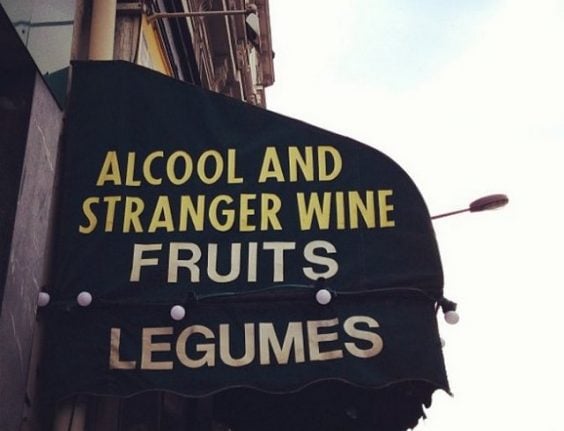Some of these are just odd, other are plain wrong, and some translators have given up completely and gone home.
“Piece of the butcher anyone?”
1. Ze classic Engleesh fish and ships

redamidjek/ Instagram
2. How to confuse your children
Both the French and English are wrong here, this whole image is just a mess.

@MBlake482/ Twitter
3. The best shirts are made inside a real Turkey
A classic Google translate error here, when Turquie (the country) is mistaken for dinde (the bird).
.jpg)
4. In France, toothpaste is basically your personal assistant.
Ok, ok “émail” is a French word for enamel, but it made us chuckle anyway.
.jpg)
Charlotte Pines/ Instagram
5. Tuck into a delicious “piece of the butcher” at this restaurant
Or perhaps a “silly chocolate pear” is more to your taste? We've pointed to our favourites, but there's plenty more to find on the menu.
.jpg)
Sent in by reader Wendy Bond Brookes
6. Wine from a stranger or wine that is “more strange”?
This shopkeeper fell victim to the étranger double meaning of both “stranger” and “foreign”.

@ohheyyjen/instagram
7. Always check your translations over before you go ahead and print it on your window
Little known fact: goats made entirely of cheese and “campinge deer” are said to roam countryside in some parts of France.
.jpg)
Gideon/Flickr
8. These little frogs are having a terrible time of it in the park
If the English translation wasn't weird enough already, why do the exclamation marks get translated to question marks?? Is even the writer even questioning what he's talking about ??

Simon Doggett/Flickr
9. Keep up the hard work, room.
“Room under construction” could have been a better alternative.

Andrew Ross/Flickr
10. No hygienic napkins here
Whoever wrote this has got their serviettes (napkins) and serviettes hygéniques (sanitary towels) in a mix up.

ElPadawan/Flickr
You'd have thought we'd be on safe ground with numbers, but even they seem to have some translators in a twist.
11. This pasta dish takes an extra 20 minutes if you cook it in French.
.jpg)
porkchopsammich/ Reddit
12. While this tent takes five minutes less time to set up in French.
.jpg)
expldplastic/ Imgur
13. And this 24-port ethernet switch only has 16 ports for French speakers.
.jpg)
iammandalore/ Reddit
Some translators decided to just pack it all in and call it a day…
14. A quick and simple way to translate text is to just write the name of the language in front of it.
Works like a charm.
.jpg)
Smacksaw/ Imgur
15. Or even just repeating “French translation” over and over makes the words appear by magic
How did this get past anyone in the office?
.jpg)
@DohMtl/ Twitter
By Rose Trigg




 Please whitelist us to continue reading.
Please whitelist us to continue reading.